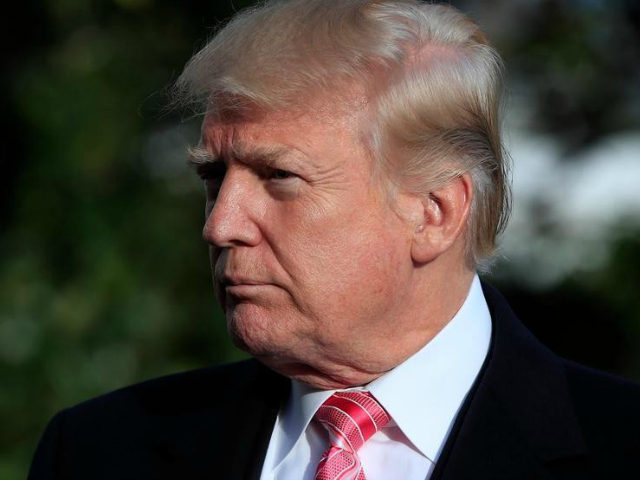A report Tuesday suggested that President Donald Trump will soon appoint Philip Goldberg, a former U.S. ambassador to Bolivia and the Philippines, to the top post in the U.S. embassy in Cuba.
Goldberg brings to the table extensive experience with belligerent countries and world leaders. The leftist government of Bolivia, which is allied with Cuba, expelled Goldberg and branded him persona non grata in 2008 for “conspiring against democracy,” a claim the State Department called “baseless.”
Last year, Goldberg served as ambassador to the Philippines, where President Rodrigo Duterte responded to criticisms of his rape jokes by calling Goldberg an “annoying” “bakla [homosexual]” and “son of a whore.”
The news service Reuters reported on Tuesday that “sources familiar with the matter” had told their reporters that President Trump was prepared to appoint Goldberg as the charge d’affairs at the Havana embassy. As the United States and the communist regime in Cuba do not have formal diplomatic relations, there is no ambassador post in Cuba. The American embassy is also currently staffed only by essential personnel in the aftermath of a series of unexplained attacks on American officials and their relatives in Havana.
The Reuters report cites “a U.S. congressional aide” who said of Goldberg on Monday that he was “career and the best of the best.”
The Associated Press also reported that a source had told their reporters that Goldberg would be assigned to the Cuba post.
Goldberg has taken on some of America’s most contestuous relationships abroad. In Bolivia, he served from 2006 to 2008 as the top U.S. representative under leftist president Evo Morales, who has fostered close ties to the rogue regimes of Venezuela and Cuba while promoting coca trade around the world. Goldberg’s time in Bolivia came to an end after the diplomat met with the opposition governor of Santa Cruz province, Ruben Costas, and amid some of the tensest moments in the relationship between the Bush administration and Hugo Chávez’s Venezuela. That year, Morales expelled Goldberg, stating in a national speech that Goldberg had been “conspiring against democracy and seeking the division of Bolivia.”
“Without fear of the empire, I declare Mr. Goldberg, the U.S. ambassador, ‘persona non grata,'” Morales declared. The leader would go on to claim that unspecified right-wing elements had conspired to assassinate him.
Venezuela notably expelled its own U.S. ambassador shortly thereafter.
Later discussing the incident, Goldberg would go on to tell Newsweek that he felt his expulsion was not a personal matter, as he “had been the subject of really outrageous attacks for some time. So had the United States as well as the USAID program and the Peace Corps. This wasn’t a new tactic.”
“As the [U.S.] State Department mentioned the other day, there are presidents in Latin America, such as Chavez of Venezuela and Morales in Bolivia, who were elected democratically but may not be governing completely democratically. That is a problem and a serious issue. And it’s a problem for the region,” Goldberg noted, adding in the same interview concern for the growing role of Iran in Latin America, an issue that until recently had not been at the forefront of U.S. concerns.
Goldberg’s other major ambassadorship began in the Philippines in 2013, where he served relatively quietly until the election of current president Rodrigo Duterte in 2016. Goldberg issued a statement condemning Duterte in April 2016, before Duterte was elected. As a candidate, Duterte joked about the gang rape and murder of an Australian citizen in Davao City, where he served as major, jokingly lamenting that he did not also have sex with the woman.
“Any statements by anyone, anywhere that either degrade women or trivialize issues so serious as rape or murder, are not ones that we condone,” Goldberg said, in a gesture of support for Australian Ambassador to the Philippines Amanda Gorely.
Duterte responded months later, now as president. In a wide-ranging speech in August 2016, Duterte noted that he had met with former secretary of state John Kerry. Kerry, he said, was “okay, but I had an argument with their ambassador, that bakla [homosexual]. Son of a bitch, he really annoys me.”
Goldberg left his post in October, telling local media that he would “leave with my integrity” and was grateful for “the friendship of so many Filipinos and with all of the legacy that we have created.” He added that he believed his condemnation of Duterte’s joke was “a very mild statement” and hoped that his relations with the United States would improve.
Now, Goldberg may be arriving at an embassy that is barely functional after opening at President Barack Obama’s command in 2015, after decades of inoperability. The current charge d’affairs in Havana, Jeffrey DeLaurentis, was appointed as an interim during a period in which the Democratically-run U.S. government issued concessions to the Castro regime in the hopes of inspiring a “thaw” in diplomatic relations.
DeLaurentis heralded the reopening of the embassy as “the beginning of a new chapter” at the time, stating of the policy itself, “it’s a long, complex road to travel, but it is the right road.”
Two years later, the American embassy in Cuba had to be evacuated of its non-essential staff following a series of attacks on U.S. personnel and families. Over 20 Americans in Cuba working for the State Department reported “medical symptoms” in response to what Secretary of State Rex Tillerson called a series of “attacks.” While the State Department itself never provided more specifics, citing the need for medical privacy, various reports indicated that the individuals affected heard loud static sounds that eventually triggered hearing loss, headaches, mild brain damage, and other concussive symptoms.
The State Department expelled 15 Cuban agents from their post in Washington, DC, in addition to retrieving the Americans stationed on the island.

COMMENTS
Please let us know if you're having issues with commenting.